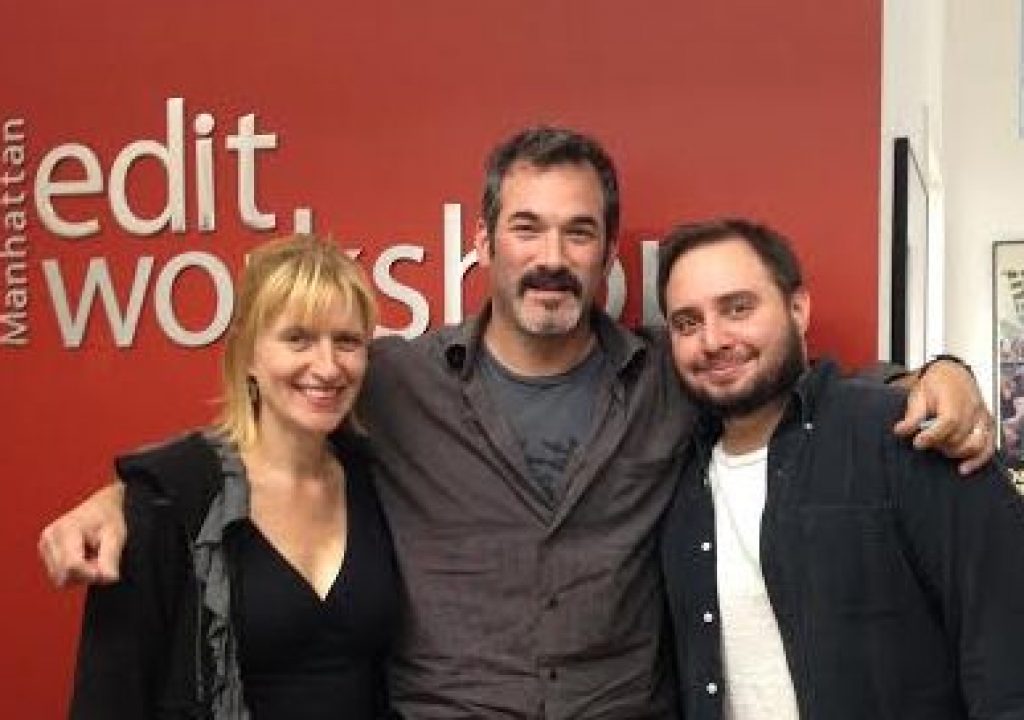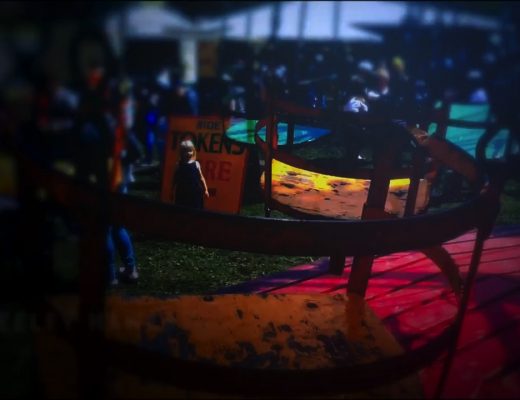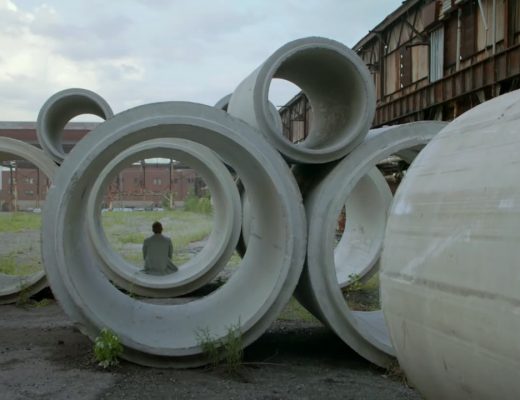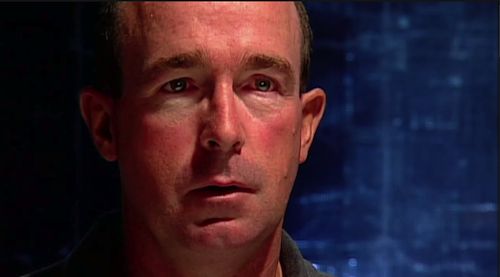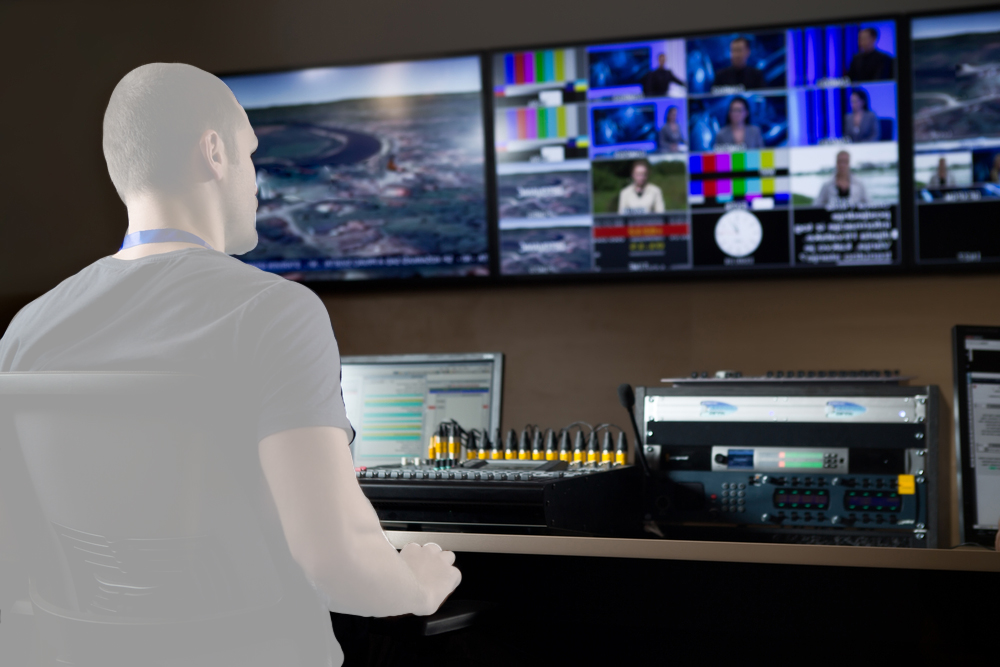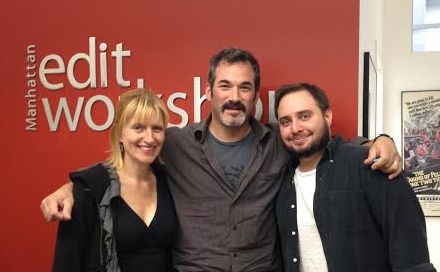 MEWShop recently sat down with our September 2014 Six Week Intensive Artist in Residence Sabine Hoffman, ACE.
MEWShop recently sat down with our September 2014 Six Week Intensive Artist in Residence Sabine Hoffman, ACE.
Sabine has edited independent feature films for over 12 years, including Rebecca Miller’s films Personal Velocity (Sundance Grand Jury Award and Best Cinematography winner and also the winner of the John Cassavettes Award) , and The Ballad of Jack and Rose (starring Daniel Day Lewis). She edited Morgan J. Freeman’s Desert Blue and Hurricane Streets (which won the Audience, Best Director and Best Cinematography awards at the Sundance Film Festival), Alex Sichel’s All Over Me (a Teddy Award winner at the Berlin Film Festival), The Day the Ponies Come Back, directed by Jerry Schatzberg (also director of Panic in Needle Park) and Harlem Aria (winner of three Audience Awards: Urban World Film Festival in NYC, the Chicago International Film Festival, as well as the Los Angeles Pan African Film Festival), directed by William Jennings, starring Damon Wayans and Gabriel Casseus.
Manhattan Edit Workshop (MEWShop): Where did you grow up and what kind of film education did you receive?
Sabine Hoffman: I came to New York from Berlin, where I had studied Art, Film History and Philosophy, before being pulled into film editing by a series of coincidences.
MEWShop: How did you get your start?
SH:On a production I had worked on, the director invited and encouraged me to visit the editing room. My first encounter was rather anti-climactic: entering a mostly dark room, in its center a colossal Steenbeck editing table, surrounded by trim-bins, neatly labeled film cans and boxes, logbooks and wall charts… being here did not seem half as exciting to me than the thrill of the set, racing the sun, communicating with director, actors, crew and locations, as I had to previously on projects as an assistant director. However, I quickly learned and witnessed that it was here that the final version of the story was built and was amazed to see how performances could be altered, the ways that time can be stretched or condensed, an actors’ gaze utilized in many ways, and how a few frames can change the feeling of something said or unsaid. It was the unsaid especially, that fascinated me, the “between” the lines and the fragility of our perception; I fell in love irreversibly.
MEWShop: Which film/films inspired you to be an editor when you were younger?
SH: I grew up in a small town in Germany. On Sunday afternoons my father would take us out to the movies to give my mom some rest and we would watch the latest (synchronized) Bond movie or other multiplex releases, followed by ice cream and getting flowers to bring home to my mom. Later, art became a big part of surviving my teenage years. I was lucky to have had a brilliant and inspiring art teacher in high school (a founding member of the German group Kraftwerk,) who stretched the importance of hard work, studying classics and daily practice, encouraging our own investigations. In and outside of school, I was learning drawing and photography, spent hours in the dark room, printing press and was working in a theater group; we debated existentialism and Nietzsche and adored the films of the Nouvelle Vague, yet I also loved Fassbinder and Loach, Fellini and Greenaway and many, many others. Seeing how Berlin Alexanderplatz adapted the novel via a 14-part series in the 80’s, watching The Fire Within make us experience the vortex of a man’s turmoil (later brilliantly re-adapted by yet another incarnation, directed by Joachim Trier), Ridley Scott’s Blade Runner questioning our humanity, Scorsese and Lynch, endless inspiration and challenge to question our perception, self understanding and world views. There was not a specific film that moved me to eventually pursue this form, it was the sorcery of the power of transformation that I was fascinated by and the possibilities to play with time, space, conjuring empathy, inciting emotion and luring us into other states of awareness and experience in ways neither theater nor other visual arts quite seemed to be able to. For me it is never a specific scene or edit, but the whole that makes a story/film effective. Editing always uses the powers of contrast and association and makes our mind leap, making reason and creating relation; our minds and its interpretations are the most powerful editors around.
MEWShop: If you had your choice what editing software would you use to edit with?
SH: I started out editing on a Steenbeck. It was a revelation when the first non-linear systems came out and I enthusiastically worked as an intern at a commercial house for a summer just to learn the then top-notch “emc2” editing system. I’ve learned several other platforms since, but Avid is still my favorite at the moment, grateful for its simple media management and script sync. Our platforms and tools will keep changing and I expect we will have to keep learning. It is paramount to create a community and forums, where we can exchange among colleges regarding technical challenges and learn from/with each other.
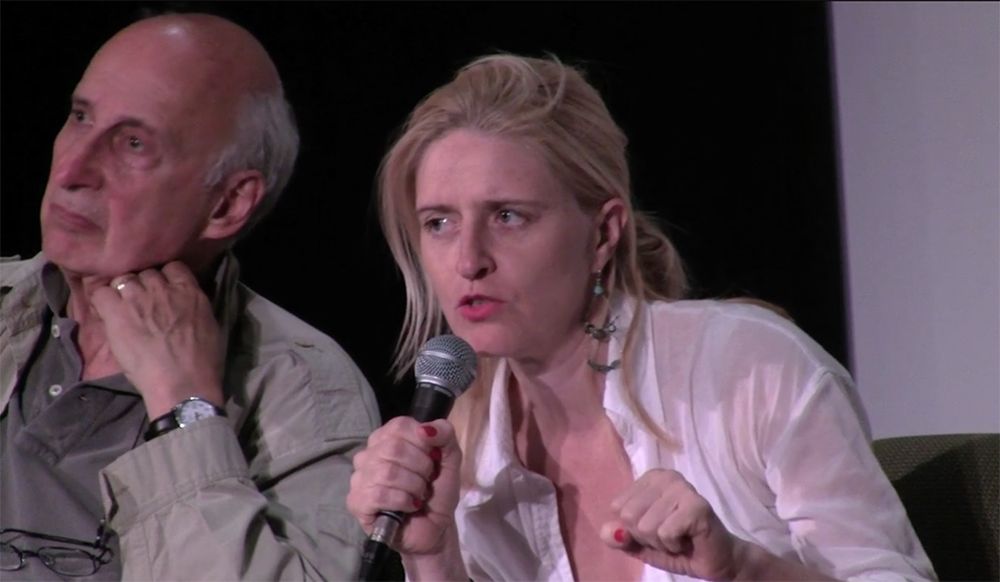
Sabine Hoffman
MEWShop: What are some of the qualities in yourself and others that make one suitable in your opinion to be an editor?
SH:Patience, passion, perseverance and a deep interest in people’s experiences, stories, emotions and what makes us tick. Always have the curiosity to discover and the tenacity to find solutions. Try to maintain a beginner’s mind to keep perspective.
MEWShop: What skills do you look for in an assistant editor?
SH:Loyalty and reliability, accuracy. Being highly organized and able to clearly communicate, kindness and commitment. I expect complete honesty and will help out with/cover for problems rather than not knowing about them in the first place; an enthusiastic assistant will always have my support and I will recommend and help her/him find their own path.
MEWShop: If you had to be something other than an editor what would it be?
SH: I love how in editing story telling we work in movements and layers, play with different tonalities, contrasts, flows and juxtapositions – if I had to pick another dream job, I might be a composer.
MEWShop: Did you have a mentor? Who were they?
SH: I am a huge believer and appreciator of mentorship. It takes a village and film is a collaborative art form. While working as an AD on a project in Berlin, we shot with a backwards-running camera (the main character woke up in a backwards running world); we had to choreograph every shot very accurately. The director (Rene Perraudin) invited me to observe the editing process. I passionately “caught fire” there, and with the kindness of his further support and that of many other people along the way; I got to learn more and more and eventually work on my own. I believe it is paramount to share our knowledge and experiences with each other and future colleges and create forums for such exchange.
MEWShop: Is there anything you do outside of editing that helps sharpen your storytelling skills?
SH: Being interested in people, listening to their stories, reading, non-fiction and fiction, poetry, concerts, seeing paintings and other art forms- we are lucky to live in a city full of unlimited cross-disciplinary inspiration. For Rodney Evan’s Brother to Brother, I read authors of the Harlem Renaissance and we searched for interesting stock footage, for another project (yet to be realized) I read and fell in love with the writings of Philip K. Dick. It can be writing or visual art and often music that brings inspiration to a project in progress.
MEWShop: Can you recommend any editing books?
SH: Some of my favorites: Jean Claude Carriere: “The Secret Language of Film”, “This is Orson Welles” (in conversation with Peter Bogdanovich), Truffaut interviewing Hitchcock, Walter Murch (all of his writings), and Tarkovsky “Sculpting in Time”.
MEWShop: Has the job description of the editor changed in the last 10 years? If so how?
SH: With new and shifting formats, Editors today have to be very versatile. Technically a lot of additional work is now done in the “offline” phase that used to be handled by other departments or vendors. However, the real skills of a great editor are story telling abilities and offering perspective; technology is just one tool in this process; there is a wonderful joy in brainstorming, in finding solutions and sharing ideas. I always want to create a safe and playful space for our creative explorations in my editing rooms.
MEWShop: Where do you see the industry of post-production evolving over the next decade? What technology advancement in post-production has affected you the most in your work?
SH: I believe we are on the cusp of a transition of story telling formats, as the traditional formats and their distribution are being rivaled by new platforms, shorter formats, longer series, new venues and binge watching. We will create new shared viewing experiences and locations. I can imagine a franchise of private screening rooms and cinephile clubs, e.g. streaming an entire season of a popular show as you might watch the world soccer series. I also find it extremely important to create alliances, being each other’s mentors, creating a community, forums, sharing resources. In NYC, many organizations offer workshops, panels, mixers and networking opportunities, e.g. the IFP or The New York Post Alliance, (which was instrumental in bringing post business and work back to New York in recent years).
MEWShop: What project(s) are you working on now?
SH: I recently finished working for Richard LaGravenese on his adaptation of “The Last 5 Years”, based on Jason Robert Brown’s “Broadway Musical,” starring Anna Kendrick and Jeremy Jordan. It was possibly my most joyous and rewarding experience so far; having brilliant writing, music and performances to play with is wonderful. Of course all of Rebecca Millers films are also highlights, as she is so brilliant and fearless in her work; I am extremely grateful to all the amazing directors I had the honor and pleasure of working with and am very lucky that my experiences are mostly happy ones.
MEWShop: What was your most challenging experience as an editor?
SH: The challenges I experienced had in most cases to do with lack of time or money; also technical problems or disorganization can make post unnecessarily difficult or lengthy.
MEWShop: Any other advice you can offer aspiring filmmakers and editors out there?
SH: I feel especially honored when directors have asked me to read early drafts, come to table readings and participate long before the shoot. I strongly advocate getting your editor involved as early as possible, even before the script is entirely locked, if possible. I sometimes was able to help with condensing scenes/set ups and we could address transitions, characters, or dramaturgical challenges before the shoot. It is also essential and cost effective to discuss workflow and process. Bring on a post supervisor, if possible and “fix it in prep” (as Nic Harvard re-coined the famous term). For me it is immensely beneficial to understand the directors’ and producers’ intentions and vision as deeply as possible, know about the characters and their back stories and have a sense of the historical or sociological context of the story.
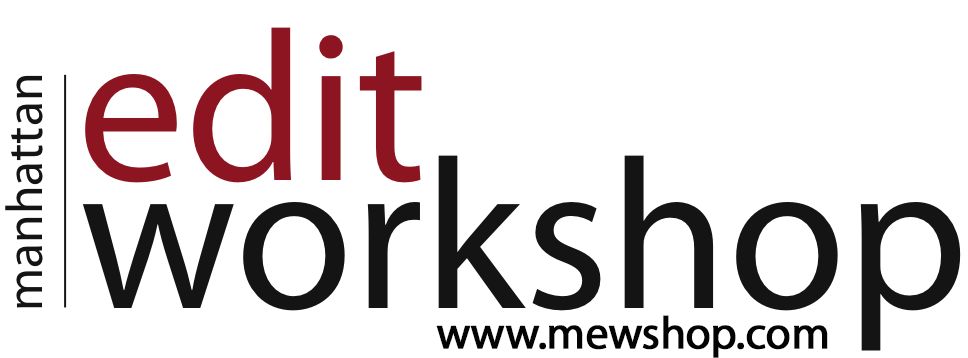 About The Six Week Intensive Course at Manhattan Edit Workshop (@MEWShop): Our signature workshop in the art and technique of editing is a comprehensive jump-start for anyone serious about a career in post-production.
About The Six Week Intensive Course at Manhattan Edit Workshop (@MEWShop): Our signature workshop in the art and technique of editing is a comprehensive jump-start for anyone serious about a career in post-production.
In addition to certified training in Avid Media Composer, Adobe Premiere Pro, FCPX and After Effects, we devote time each day to film theory; covering the history & evolution of editing technique, as well as the aesthetics of narrative, short-form, comedy and documentary. You’ll not only learn the tools – you’ll understand why we use them. Learn more about our Six Week Intensive Course by going to https://www.mewshop.com/six_week_workshop/overview/.
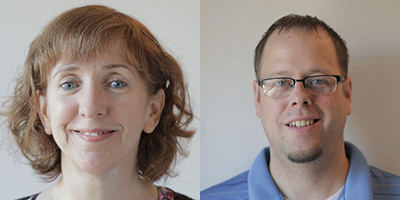 About the Authors: Janet Dalton is a freelance editor, as well as Director of Education at MEWShop, where she develops curriculum and is a certified instructor in Avid Media Composer, Adobe Premiere Pro & Apple Final Cut Pro. Jason Banke is President of Manhattan Edit Workshop overseeing all of MEWShop’s operations; including instructors, employees, courses, marketing, events and facility management. He also shoots and edits his own projects outside of MEWShop.
About the Authors: Janet Dalton is a freelance editor, as well as Director of Education at MEWShop, where she develops curriculum and is a certified instructor in Avid Media Composer, Adobe Premiere Pro & Apple Final Cut Pro. Jason Banke is President of Manhattan Edit Workshop overseeing all of MEWShop’s operations; including instructors, employees, courses, marketing, events and facility management. He also shoots and edits his own projects outside of MEWShop.

Filmtools
Filmmakers go-to destination for pre-production, production & post production equipment!
Shop Now